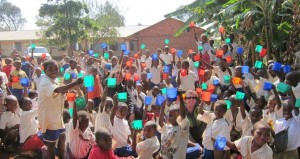Solutions and Opportunities for the Disadvantaged in Tanzania, Tanzania
(SODAT) provides breakfast and improves infrastructure for three primary schools in Ngara, Tanzania. The organization is also starting a FAITH Organic Vegetable gardening program to help families improve health and income.
Stories Donation Opportunities
Partner Since: 2011
Partner Schools: 3
Water Harvesting Systems Built: 3
School Kitchens Built: 2
2013-2014 Breakfast Meals Provided: 802,976
Gardens Built: 2
Programs
School WASH Infrastructure
SODAT facilitated Water, Sanitation, and Hygiene (WASH) Infrastructure projects at schools to increase the efficiency and effectiveness of school breakfast programs. The organization identified water shortages as an obstacle to consistently delivering breakfast to students, so water harvesting systems were built at all three schools. New kitchens were also built at two schools to ensure cooking staff had a safe area to cook and store their equipment.
School Breakfast
Ensuring that students begin their school day with a full stomach and energy to learn is one of the most effective ways to improve student performance and long-term achievement. SODAT provides breakfast for over 2,100 primary school students. They mill a breakfast flour that is formulated with a mix of fatty amino acids and proteins to improve brain functions.Since implementing the breakfast program student performance and attendance have increased.
Organic Vegetable Gardening
SODAT is in the process of starting a FAITH Organic Vegetable Gardening program with its partner schools. The organization plans to help families start their own gardens and begin working towards food self-reliance.
Community
Ngara is located in the northwestern corner of Tanzania, where the borders of Rwanda and Burundi meet. The community is home to around 10,000 people. Most people rely on agriculture for a living and make less than $2.00 per day. Overuse of land has led to the deterioration of soils, which is making farming less productive and more expensive. Climate change is also leading to more severe wet and dry seasons, making it more difficult for families and communities to stabilize water availability. The water harvesting projects at schools are one way to deal with the changing climate. Farmers will also need to adopt more holistic land management practices to maintain soil fertility.

